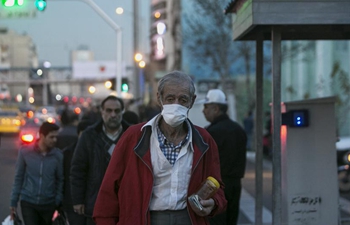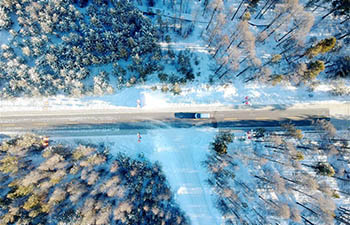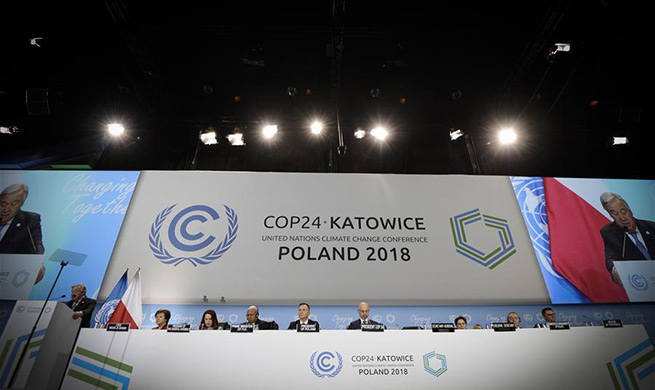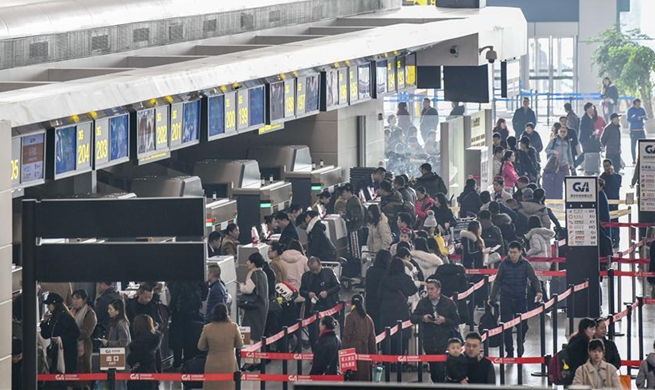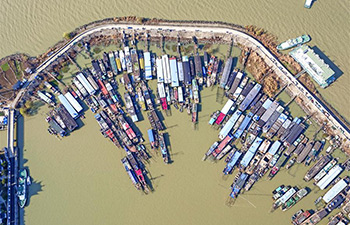MOSUL, Iraq, Dec. 17 (Xinhua) -- At the first anniversary of full liberation of Iraq from Islamic State (IS) militants, many children born during the IS rule of Mosul still live without national identities, which threatens to isolate and make them vulnerable to extremist ideas.
Thousands of children suffered from the chaos in Mosul when it was under control of IS militants. Many births were registered with IS papers and others refused to do so.
Therefore, after the liberation, most of the registered and non-registered could not get national IDs due to administrative complexities and security reviews.
Muthanna Fadhil Younis, 37 years old, a father of two daughters, had thought he was lucky for getting the old document of Iraqi health ministry when his youngest daughter was born in early months of IS rule of Mosul.
The extremist group had continued using the old government's documents for registering the new births, but later changed to their own papers signed by the self-proclaimed state.
"I thought I was lucky ... but later I found it was not enough. I was shocked by the complicated process of issuing a new national ID for my daughter," said Younis whose daughter Asil was born in early 2015, just months after IS groups seized Mosul.
"The birth of a child during the period of Daesh (IS group) is a big problem, because people realized that the existence of IS document would create difficulties and security review that would take a lot of time," Younis said.
"After the liberation, I've tried to get an ID for my 3-year-old daughter but it wasn't easy as a lot of people take long and complicated procedures at the ID office and intelligence service, so I have to try many times while I have to work for the living of my family," said Younis, working as a wireman and lives with his family in a small rented house in the eastern side of Mosul.
"I call on the government to simplify the procedures of issuing new IDs for children. Without IDs, they can't join schools, and then will be easy prey to extremism and terrorism," Younis said.
Ahmed Fat'hi, another citizen in Mosul, has similar problems as he got married in 2013 before the fall of Mosul to IS group, but he didn't update his and his wife's IDs from "single" to "married" because of the unrest.
After the fall of Mosul, they had children without IDs while their IDs remain registered as "single". After Mosul's liberation, Fat'hi and his family could not get new IDs because he has to go through long and expensive procedures.
"They (government employees) also asked me to show my mother's ID, who was killed by a huge blast during the battles, and asked me instead to issue a death certificate for her by proving the existence of her tomb. But her body was gone by the blast and has no tomb," Fat'hi said.
With anger, Fat'hi blamed the complicated procedures and finally abandoned the idea of issuing new IDs for his family members, which threatens his children's future as they are not Iraqi citizens' yet.
Fat'hi said that he didn't register the births of his children in the hospital which were under control of IS militants, because he believed that the militants would soon be dislodged from the city.
"I never thought of registering my children in hospitals controlled by IS militants, in order to avoid interrogations by the security forces after liberation," Fat'hi added.
Yasir Noor al-Din, who was sitting in front of his badly damaged house in the old city of Mosul, told Xinhua "we've got fed up with the complexities of our children's IDs, just to prove that they are our sons."
He said that the problem affects their children, marriage documents, death certificates and other documents issued under IS rule.
Many people of the old city in western Mosul lost their official documents, either taken by IS militants who used them to escape the troops' checkpoints, or lost by the devastation of their houses.
"Many people are suffering from such problem, especially in the badly damaged neighborhoods in Mosul," the Noor al-Din concluded.
Sukaina Mohammed, head of women and child office in Nineveh's provincial government, told Xinhua that the three years under IS control made changes to Mosul society and security review is important.
"Legal and security procedures are necessary, as many women claimed that their husbands went missing or dead, but no one said that some of the deaths were Daesh members. Some women were married to foreigner from Daesh organization," she said.
"There are solutions for such problems, but three years of Daesh rule made the solutions difficult. A large number of people and various kinds of problem made the security review very difficult. It needs longer time," she added.
Abdullah al-Jubouri, a security expert, told Xinhua that there are two kinds of children born under IS rule. Firstly, those whose fathers were either killed or escaped the city and some of them are foreigners. This kind of children don't get national IDs only in limited cases according to the Iraqi law.
Secondly, children born under IS rule and have IDs organized and stamped by IS group. The problem of this kind can be solved by collecting intelligence information.
"We have to sort out those who are Daesh members, cooperatives or normal citizens. That's why it takes long time to issue national IDs for them," Jubouri said.
However, Jubouri warned that those children of IS militants will constitute a danger in the future.
"Without IDs, children of Daesh members will be deprived of access to education and all health and social services, and that would isolate them and let them feel that they do not belong to any country, making them vulnerable to the influence of the terrorist organizations," Jubouri said.
Jubouri recommended formation of committees from various departments to carry out a program that would rehabilitate those children and their family members to immunize them from ideological deviation.
"Those children have done nothing wrong to have fathers being Daesh militants. The children are victims and we must help them to integrate into the society and not leave them to be exploited by the terrorist groups," Jubouri concluded.
In June 2014, the IS group took control of large swathes of territories in western and northern Iraq, about 40 percent of the country's land at its peak.
However, the Iraqi forces, backed by tens of thousands of volunteers, known as Hashd Shaabi paramilitary units, as well as the U.S.-led air support, managed to dislodge IS militants from their strongholds across the country.
On Dec. 9, 2017, former Iraqi Prime Minister Haider al-Abadi officially declared full liberation of Iraq from IS militants after Iraqi forces recaptured all the areas once seized by the extremist group.







